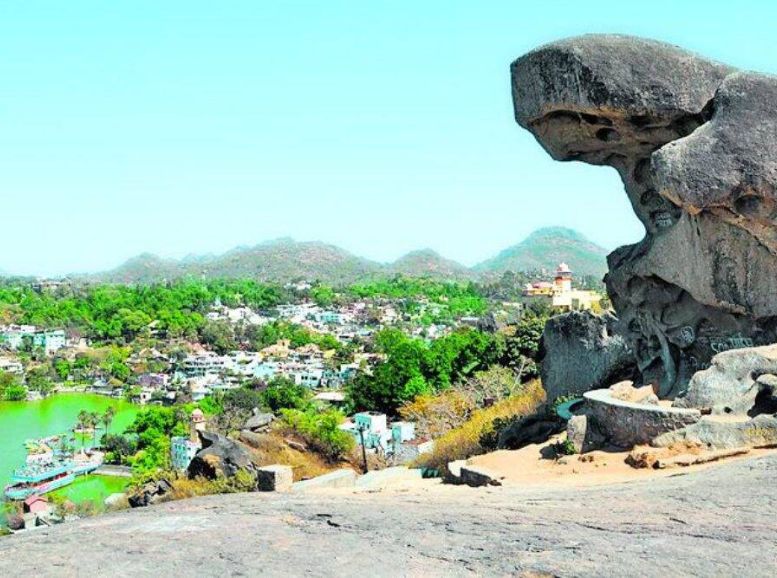Cradled within the majestic Aravalli Range of Rajasthan, India, Mount Abu emerges as a tranquil escape. A verdant haven amidst the arid plains, it offers a refreshing respite from the desert’s scorching heat. This unique hill station in Rajasthan boasts a vibrant tapestry of treasures, from time-worn temples and sacred lakes to awe-inspiring viewpoints and wildlife sanctuaries. Mount Abu’s magic transcends its breathtaking landscapes, encompassing a rich history and deep spiritual significance. As visitors meander along its winding paths and discover its peaceful corners, they are enveloped by the timeless charm of this mountain retreat. Here, amidst the embrace of serenity and tranquility, the chaos of everyday life gently fades away.
How to reach:
- Air: Maharana Pratap Airport in Udaipur, roughly 185 kilometers away, serves as the closest air hub. Taxis and buses are readily available for the onward journey to Mount Abu.
- Train: Abu Road Railway Station, approximately 28 kilometers distant, is the nearest rail access point. Regular trains connect Abu Road to major cities like Delhi, Mumbai, Jaipur, and Ahmedabad. Taxis and buses can then be used to reach Mount Abu from Abu Road.
- Road: Mount Abu boasts excellent road connectivity to major cities in Rajasthan and nearby states. State-run and private buses, along with taxis, provide frequent services from cities like Udaipur, Ahmedabad, Jaipur, and Jodhpur. The scenic Aravalli Range graces the road journey, making it a visually delightful experience.
Getting Around Mount Abu:
Once in Mount Abu, navigating the town is a breeze. Taxis, auto-rickshaws, and rentals like motorcycles or bicycles offer convenient local transportation options. Many attractions are conveniently located within walking distance, allowing visitors to explore the town at their own pace.
Best time to visit:
Winter Wonderland (November to February): Mount Abu transforms into a tourist haven during winter, thanks to its delightful climate. With temperatures hovering between 12°C and 29°C, it’s perfect for exploring the outdoors, sightseeing, and immersing yourself in the hill station’s natural beauty. Chilly evenings cloak the atmosphere in a romantic charm, making it a favorite among honeymooners and couples.
Monsoon Magic (July to September): The monsoon season ushers in moderate to heavy rainfall, revitalizing Mount Abu’s lush landscapes. The vibrant greenery and picturesque waterfalls create a breathtaking spectacle, with mist-shrouded hills adding to the allure. However, outdoor activities might be restricted due to rain, and trekking paths could become slippery. If you find serenity in the pitter-patter of rain and prefer a tranquil Mount Abu experience away from the crowds, the monsoon season can be an ideal choice.
Post-Monsoon Paradise (October to mid-November): Following the monsoon, Mount Abu experiences occasional showers that further elevate its natural beauty. Pleasant weather persists, with temperatures ranging from 17°C to 32°C, making it suitable for outdoor activities like trekking, nature walks, and exploring local attractions.
Attractions:
Dilwara Jain Temples:
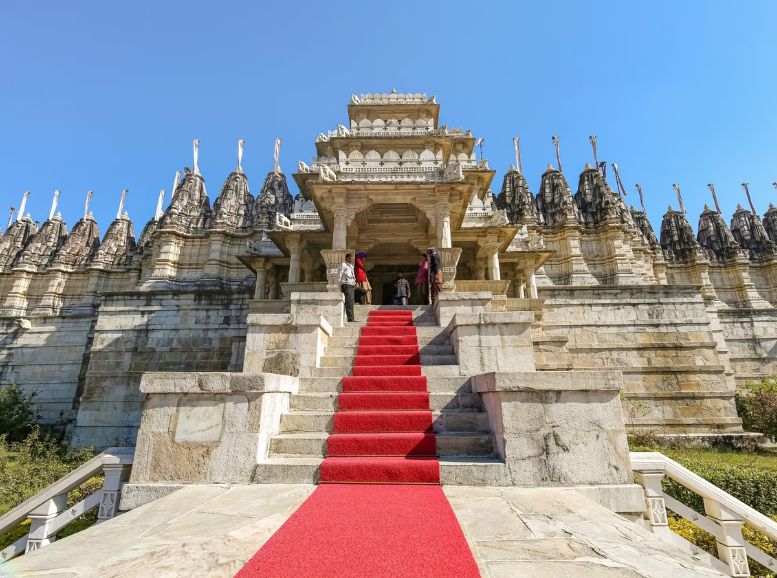
Crafted from luminous white marble, the Dilwara Jain Temples stand as a testament to the fusion of artistry and faith. Dating back to the 11th and 13th centuries, these architectural marvels are dedicated to Jain Tirthankaras. Visitors are drawn not only by the spiritual aura but also by the exquisite carvings that grace every surface. Intricate floral motifs and figures from Jain mythology adorn the marble walls, each detail whispering stories of a bygone era.
Nakki Lake:
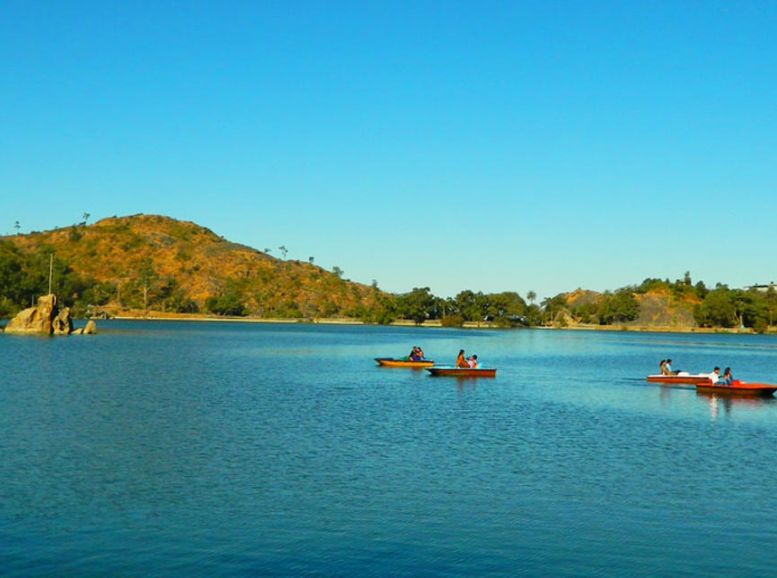
Nestled in the heart of Mount Abu, Nakki Lake shimmers as a tranquil jewel amidst verdant hills. This picturesque water body beckons visitors with its serene atmosphere. Whether you choose to glide across its surface on a boat, meander along the scenic promenade, or simply soak in the calming ambiance, Nakki Lake offers a delightful experience. Steeped in history and mythology, the lake’s charm deepens further. Local lore whispers tales of its creation, some attributing it to the handiwork of deities using their nails, while others speak of a revered sage seeking divine favor.
Mount Abu Wildlife Sanctuary:
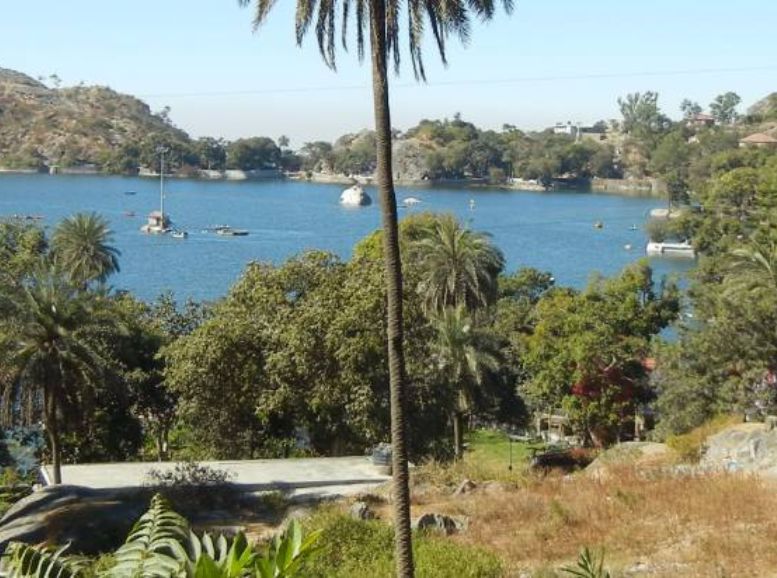
Spread across a vast area of around 288 square kilometers, the Mount Abu Wildlife Sanctuary is a haven for diverse flora and fauna. Visitors can explore the sanctuary on jeep safaris or trekking trails, encountering species like sloth bears, leopards, wild boars, and a vibrant array of birdlife. Keep your eyes peeled for elusive langurs swinging through the dense foliage, and listen for the melodious calls of exotic birds flitting between the branches. The sanctuary provides a vital habitat for these creatures, ensuring the ecological richness of the region thrives.
Guru Shikhar:
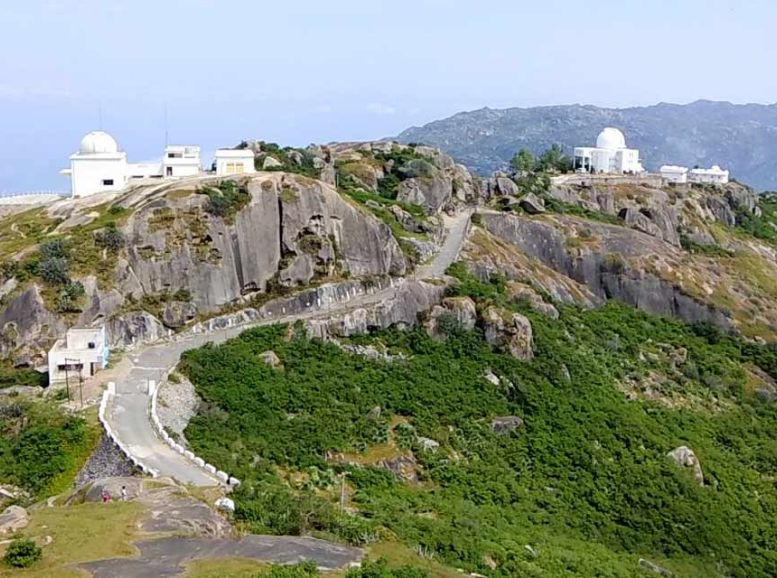
Crowning the Aravalli Range, Guru Shikhar reigns supreme, offering unparalleled vistas of Mount Abu and its emerald embrace. The trek to Guru Shikhar is a well-trodden path for those seeking adventure and a taste of nature’s majesty. As you conquer the ascent, the landscape transforms into a breathtaking panorama. Rolling hills unfurl beneath you, carpeted in verdant valleys, while distant plains fade into the horizon.
Achalgarh Fort:
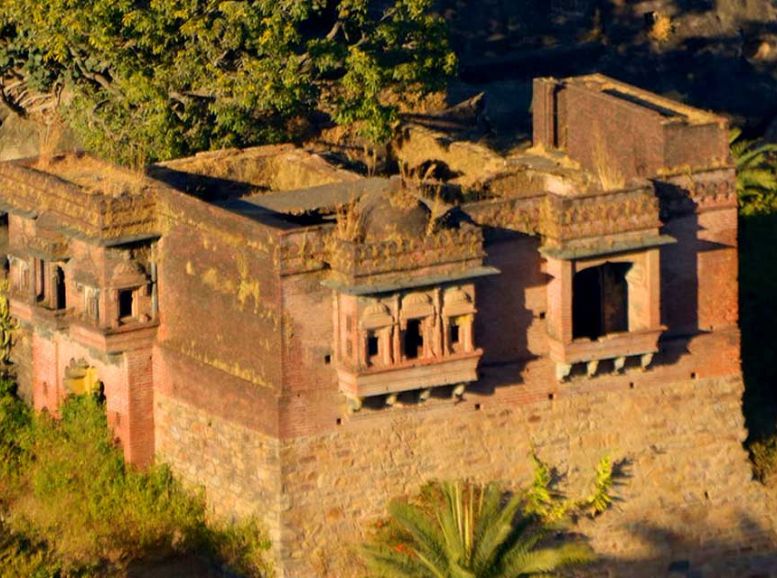
Achalgarh Fort, a bastion draped in history and architectural grandeur, beckons history buffs to explore its ancient ramparts. This once-mighty fortress, now partially in ruins, whispers tales of Rajput valor and resilience. Within its walls lie architectural gems like the Achaleshwar Mahadev Temple and Kantinath Jain Temple, each showcasing exquisite craftsmanship. Intriguing structures like the Mandakini Kund, a stepwell, and the Achalgarh village nestled within the fort grounds, offer a glimpse into the lives of those who once called this formidable structure home.
Sunset Point and Honeymoon Point:
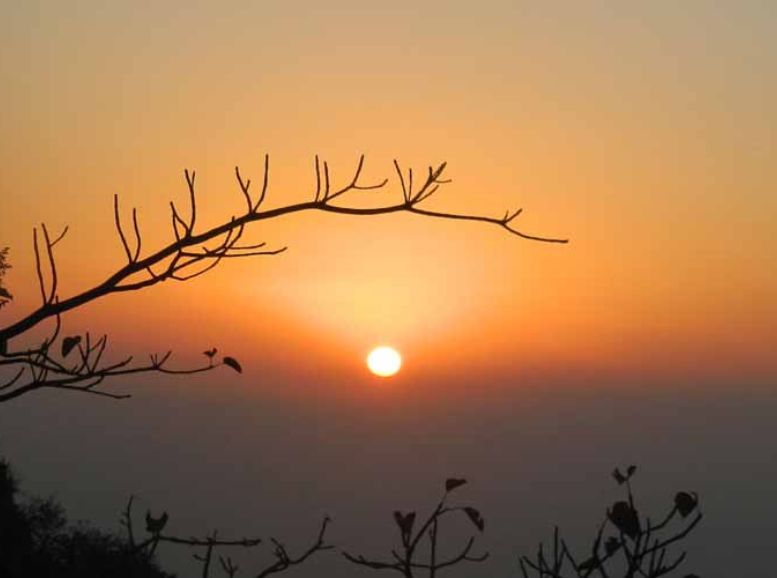
As the sun dips below the rugged Aravalli Range, Mount Abu’s viewpoints come alive with a mesmerizing display. Sunset Point, perched atop a scenic hillock, offers breathtaking panoramas. Here, the fiery orb descends, casting a kaleidoscope of orange, pink, and purple across the canvas of the sky. Honeymoon Point, aptly named for its romantic charm, provides a more intimate setting to witness this celestial masterpiece. Couples can share a quiet moment hand-in-hand as the world around them transforms into a warm, twilight wonderland. For those seeking a more adventurous perspective, hidden viewpoints await at the end of trekking trails, promising an even more unforgettable encounter with this nightly spectacle.
Toad Rock:
Local experiences:
- Witness the Magic of Rajasthani Performances: Immerse yourself in the vibrant tapestry of Rajasthani culture by attending a local program. Be captivated by the graceful twirls of Ghoomar dancers and the energetic steps of the Kalbelia tribe, all accompanied by soul-stirring music and dazzling attire. These evening performances offer a captivating window into Rajasthan’s rich heritage.
- Treasure Hunt at Nakki Lake Market: Embark on a delightful shopping spree at the bustling Nakki Lake Market. Here, vendors proudly display an array of local handicrafts, souvenirs, and Rajasthani textiles. From fabrics adorned with intricate embroidery to handcrafted pottery and gleaming jewelry, the market overflows with treasures waiting to be discovered. Take home a piece of Rajasthan to cherish as a memento of your trip.
- A Culinary Adventure: Savor the Flavors of Rajasthan: Tantalize your taste buds with a delectable journey through Rajasthani cuisine. Sample local specialties like Dal Baati Churma, a hearty combination of lentils, dumplings, and fried crumbs, or savor Gatte ki Sabzi, a flavorful chickpea flour curry. Don’t miss Ker Sangri, a unique dish made with desert beans and berries. Pair these delicacies with traditional breads like Bajre ki Roti (millet flatbread) and Makki ki Roti (corn flatbread). Conclude your culinary exploration with a touch of sweetness by indulging in Rajasthani favorites like Ghevar (a disc-shaped sweet) and Malpua (pancakes dipped in syrup).
- Unveiling Mount Abu’s Street Art Scene: Stroll through the vibrant streets of Mount Abu, adorned with a captivating display of street art. These colorful murals depict scenes from local folklore, mythology, and everyday life, breathing life into the town and offering a glimpse into the artistic soul of the region. Capture these whimsical artworks for a unique memento of your visit.
- Master the Art of Rajasthani Cuisine: Take your culinary adventure to the next level by participating in a local cooking class. Under the guidance of experienced chefs, learn the secrets behind traditional Rajasthani dishes, from the selection of authentic spices to the mastery of cooking techniques. This hands-on experience allows you to bring the flavors of Rajasthan back to your own kitchen, recreating these delectable dishes for friends and family.
- A Spiritual Sojourn: Explore Sacred Temples: Embark on a spiritual journey by exploring the sacred temples scattered across Mount Abu. Each temple boasts unique architecture and holds a deep spiritual significance. Participate in traditional rituals and prayers, or simply soak in the serene atmosphere of these holy sites. Adhar Devi Temple, Arbuda Devi Temple, and Shri Raghunathji Temple are some noteworthy temples to include on your itinerary.
- A Glimpse into Rajasthani Traditions: Witness a Rajasthani Wedding (if fortunate): Consider yourself lucky if you receive an invitation to a Rajasthani wedding during your visit. Witness the grand celebration of love and tradition firsthand. Immerse yourself in the vibrant colors of the ceremony, the lively music and dance performances, and the delectable feast – a truly unforgettable experience showcasing the heart of Rajasthani culture.
Travel tips:
Dress for the Season: Mount Abu’s climate varies throughout the year. Pack light, breathable clothing for summer adventures. Winters require warmer layers, especially for chilly evenings. Comfortable walking shoes are a must for exploring the town and its treasures.
Plan Your Stay: Mount Abu boasts diverse accommodations, from hotels and resorts to charming guesthouses and homestays. During peak season, booking in advance secures the best deals and ensures availability.
Hydration is Key: Especially during dry summers, staying hydrated is crucial. Carry a reusable water bottle and sip frequently throughout the day, particularly if you’re active outdoors or trekking.
Respect the Culture: Show respect for local customs and traditions. Dress modestly when visiting temples and religious sites. Always ask permission before photographing people, especially locals.
Mind the Monkeys: Mount Abu’s resident monkey population, particularly around popular spots like Nakki Lake and Sunset Point, can be mischievous. While adorable, they might snatch food or belongings. Avoid feeding them and maintain a safe distance.
Explore Beyond the Usual: While iconic attractions like Nakki Lake and Dilwara Jain Temples are must-sees, venture beyond the tourist trail. Explore hidden gems and serene spots in the surrounding hills and villages for a taste of local life.
Witness the Sunset Spectacle: Don’t miss the breathtaking sunsets from Mount Abu’s viewing points like Sunset Point or Honeymoon Point. Arrive early to secure a good spot and witness the mesmerizing spectacle as the sun dips below the horizon, painting the sky with fiery hues of orange and pink.
Trekking Safety: If you plan to explore Mount Abu’s scenic hills on foot, come prepared. Wear proper footwear, carry sufficient water and snacks, and stick to designated trails, especially on unfamiliar terrain. Consider hiring a local guide for added safety and navigation assistance.
Conclusion
Bid farewell to ordinary vacations and embrace the captivating beauty, rich culture, and tranquil serenity of Mount Abu. Explore the intricate artistry of the Dilwara Jain Temples, glide across the serene waters of Nakki Lake, or conquer the summit of Guru Shikhar for breathtaking panoramas. Delve deeper by participating in local activities, savoring delectable Rajasthani cuisine, and immersing yourself in the vibrant cultural tapestry. As you depart, take with you more than just souvenirs and photographs – treasure cherished memories of moments spent amidst this enchanting desert oasis. Whether you seek adventure, relaxation, or spiritual enlightenment, Mount Abu welcomes you with open arms. Discover its hidden treasures and experience the magic of Rajasthan’s sole hill station – plan your unforgettable escape today at Xplro.com!
FAQs
What distinguishes Mount Abu as a tourist destination?
- Mount Abu stands out as Rajasthan’s solitary hill station, celebrated for its cool climate, verdant landscapes, tranquil lakes, and ancient temples.
What are the primary modes of transportation to reach Mount Abu?
- Mount Abu is accessible by air through Udaipur’s Maharana Pratap Airport, by train via Abu Road Railway Station, or by well-connected roads.
When is the most favorable time to plan a trip to Mount Abu?
- The optimal time to visit Mount Abu is during the winter season (November to February), offering pleasant weather. Monsoon (July to September) and post-monsoon (October to mid-November) are also delightful for those seeking lush greenery.
What landmarks should visitors prioritize in Mount Abu?
- Noteworthy attractions include the intricate Dilwara Jain Temples, picturesque Nakki Lake, adventurous Mount Abu Wildlife Sanctuary, and scenic viewpoints like Guru Shikhar and Sunset Point.
What adventurous endeavors can tourists pursue in Mount Abu?
- Mount Abu offers a plethora of adventure activities such as trekking, rock climbing, boating, horse riding, and wildlife safaris, catering to varying levels of thrill seekers.
What lodging options are available in Mount Abu?
- Accommodations range from hotels, resorts, and guesthouses to homestays, accommodating diverse preferences and budgets of visitors.
Is Mount Abu considered safe for solo travelers?
- Yes, Mount Abu is generally considered safe for solo travelers, although exercising standard safety precautions and awareness is advised.
What culinary delights can one savor in Mount Abu?
- Mount Abu’s culinary scene features Rajasthani specialties like Dal Baati Churma, Gatte ki Sabzi, Ker Sangri, and an array of delectable Rajasthani sweets.
What festivals are celebrated in Mount Abu?
- Festivals like the Summer and Winter Festivals, Mahashivratri, and Diwali are celebrated with fervor in Mount Abu, offering visitors a glimpse into local culture and traditions.
Is it feasible to explore Mount Abu in a day trip from neighboring cities?
Yes, Mount Abu can be visited as a day trip from nearby cities like Udaipur and Ahmedabad, though a longer stay is recommended for a comprehensive experience.
Are there any restrictions on photography at Mount Abu’s attractions?
- While photography is generally allowed, visitors should adhere to signage and guidelines, especially at religious sites and monuments.
What are some offbeat experiences to relish in Mount Abu?
- Unique experiences include exploring local street art, participating in Rajasthani cooking classes, and discovering lesser-known temples and viewpoints for a more intimate visit.


